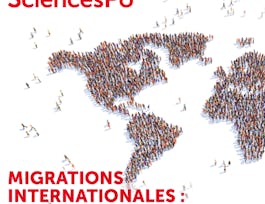Migration to and within Europe poses particular issues related to ensuring equitable access to healthcare. Throughout this course, you will gain insight into the root causes and types of migration, the current evidence and state of data in the region, examples of good practice, and how migration health can be studied and new evidence generated and translated into policy and practice.



Recommended experience
What you'll learn
definitions and legislation surrounding migrants in Europe
misconceptions about migrants' health
priorities and good practices for protecting and promoting the health of migrants in Europe
Details to know

Add to your LinkedIn profile
23 assignments
December 2024
See how employees at top companies are mastering in-demand skills


Earn a career certificate
Add this credential to your LinkedIn profile, resume, or CV
Share it on social media and in your performance review

There are 5 modules in this course
In this first module, we dive right into the root causes of migration to and within Europe, asking who, why, and where. We will explore patterns of transitions taken by people on the move and how they impact people's health. Together, we will round the module up by examining key terminologies around migration, going beyond their definitions to discuss their role in shaping how people perceive the challenges and potential solutions around migration, health, and equity.
What's included
7 videos5 readings3 assignments1 app item1 discussion prompt
In this module, our focus is on the status quo of the health risks and the health service delivery that refugees and migrants face in Europe. We are guided by the question: "What do we know about the health of refugees and migrants in Europe?" Building on up-to-date evidence, we explore the key health risks that migrants face and how their impacts shape differences in their health outcomes compared to host populations. This journey will lead us to understand the variability in healthcare provision across Europe and the importance of universal health coverage (UHC) and evidence-based guidelines. Finally, we will walk through where and how to find migrant health data and zoom in on its limitations and existing gaps.
What's included
8 videos10 readings5 assignments2 plugins
In this module, we will explore common barriers that migrants, refugees and other displaced populations experience in Europe when it comes to their health. Together we will break these down into distinct categories to better understand the various types of barriers that impact health outcomes and health service utilization. We will deep-dive into some of the most impactful examples of barriers, including the role of European and international legislation and policies, of discrimination, racism, and xenophobia, and of people's health (system) literacy. This module will sharpen our understanding of the existing gaps in Europe which is essential before progressing to our next module on how to best address them.
What's included
10 videos6 readings6 assignments1 plugin
In this fourth module, we shift gears by moving from analysing existing challenges to exploring potential solutions towards migration and health equity for all. We will start from exploring the fundamentals of migrant-sensitive and culturally-appropriate care. These themes are then put into practice by following several good practice examples which were selected from a range of actors and contexts in Europe. Through this module, you will not only take away practical tools to addressing these challenges but also - hopefully - an inspiring sense of what is possible when different actors come together to work towards a common goal.
What's included
10 videos7 readings5 assignments1 discussion prompt1 plugin
In this final module, our focus shifts forward to actionable evidence-based practice and policies. Together, we will consider the role of data and research in informing all our actions as practitioners, policymakers, or researchers. We will explore some of the notable initiatives and data platforms. Finally, we will explore ways to translate evidence into practice, including through the use of participatory research methods. Throughout this module, we tie together the content and skills covered in this MOOC and provide a positive outlook to the future.
What's included
9 videos6 readings4 assignments1 app item1 discussion prompt
Instructors


Offered by
Why people choose Coursera for their career




Recommended if you're interested in Health

Imperial College London

Sciences Po

Imperial College London

Imperial College London

Open new doors with Coursera Plus
Unlimited access to 10,000+ world-class courses, hands-on projects, and job-ready certificate programs - all included in your subscription
Advance your career with an online degree
Earn a degree from world-class universities - 100% online
Join over 3,400 global companies that choose Coursera for Business
Upskill your employees to excel in the digital economy




